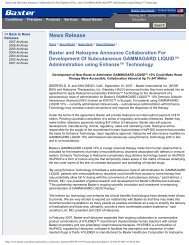IDF Patient & Family Handbook for Primary Immunodeficiency ... - IDFA
IDF Patient & Family Handbook for Primary Immunodeficiency ... - IDFA
IDF Patient & Family Handbook for Primary Immunodeficiency ... - IDFA
Create successful ePaper yourself
Turn your PDF publications into a flip-book with our unique Google optimized e-Paper software.
Selective IgA Deficiency 21<br />
Clinical Features of Selective IgA Deficiency continued<br />
A second major problem in IgA deficiency is the<br />
occurrence of autoimmune diseases. These are<br />
found in about 25% to 33% of patients who seek<br />
medical help. In autoimmune diseases, individuals<br />
produce antibodies or T-lymphocytes which react<br />
with their own tissues with resulting inflammation and<br />
damage. Some of the more frequent autoimmune<br />
diseases associated with IgA deficiency are:<br />
Rheumatoid Arthritis, Systemic Lupus Erythematosis<br />
and Immune Thrombocytopenic Purpura (ITP).<br />
These autoimmune diseases may cause sore and<br />
swollen joints of the hands or knees, a rash on<br />
the face, anemia (a low red blood cell count) or<br />
thrombocytopenia (a low platelet count). Other kinds<br />
of autoimmune disease may affect the endocrine<br />
system and/or the gastrointestinal system.<br />
Allergies may also be more common among<br />
individuals with Selective IgA Deficiency than<br />
among the general population. These occur in<br />
about 10-15% of these patients. The types of<br />
allergies vary. Asthma is one of the common<br />
allergic diseases that occurs with Selective IgA<br />
Deficiency. It has been suggested that asthma<br />
may be more severe, and less responsive to<br />
therapy, in individuals with IgA deficiency than it<br />
is in normal individuals. Another type of allergy<br />
associated with IgA deficiency is food allergy, in<br />
which patients have reactions to certain foods.<br />
Symptoms associated with food allergies are<br />
diarrhea or abdominal cramping. It is not certain<br />
whether there is an increased incidence of allergic<br />
rhinitis (hay fever) or eczema in Selective IgA<br />
Deficiency.<br />
<strong>Patient</strong>s with IgA Deficiency are often considered<br />
to be at increased risk of anaphylactic reactions<br />
when they receive blood products (including IVIG)<br />
that contain some IgA. This is thought to be due<br />
to IgG (or possibly IgE) anti-IgA antibodies which<br />
may be found in some of these people. However,<br />
it has been observed that many patients with IgA<br />
deficiency do not have adverse reactions to blood<br />
products or IVIG. There is no agreement among<br />
experts in this field regarding the magnitude of the<br />
risk of these types of reactions in IgA deficiency, or<br />
the need <strong>for</strong> caution or measurement of anti-IgA<br />
antibodies be<strong>for</strong>e administration of blood or IVIG<br />
to these individuals.<br />
Diagnosis of Selective IgA Deficiency<br />
The diagnosis of Selective IgA Deficiency is usually<br />
suspected because of either chronic or recurrent<br />
infections, allergies, autoimmune diseases, chronic<br />
diarrhea, or some combination of these problems.<br />
The diagnosis is established when tests of the<br />
patient’s blood serum demonstrate absence of<br />
IgA with normal levels of the other major classes<br />
of immunoglobulins (IgG and IgM). Most patients<br />
make antibodies normally. An occasional patient<br />
may also have IgG2 and/or IgG4 subclass<br />
deficiency and associated antibody deficiency<br />
(see chapter titled IgG Subclass Deficiency and<br />
Specific Antibody Deficiency). The numbers and<br />
functions of T-lymphocytes are normal. Several<br />
other tests that may be important include a<br />
complete blood count, measurement of lung<br />
function, and urinalysis. Other tests that may be<br />
obtained in specific patients include measurement<br />
of thyroid function, measurement of kidney<br />
function, measurements of absorption of nutrients<br />
by the GI tract, and the test <strong>for</strong> antibodies directed<br />
against the body’s own tissues (autoantibodies).
















